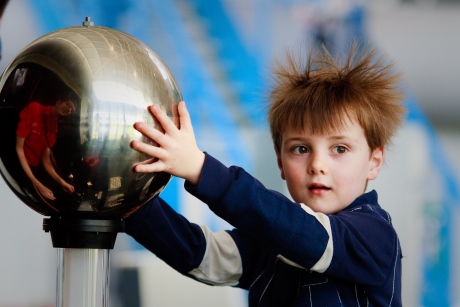 m.jpg)
The Planetarium at Winchester Science Centre.
The Winchester Science Centre and Planetarium offers curriculum related workshops, over 100 hands-on Science and Technology related exhibits, and live or pre-recorded planetarium shows for schools to attend on a visit.
Here School Travel Organiser takes a closer look at each of them and how they can relate to studies in STEM.
Exhibitions
Students can learn through real experiences and experimentation with over 100 interactive exhibits at the Winchester Science and Planetarium covering the Physical Sciences curriculum.
Exhibits range from Balancing Act, which links to the Science topic Forces in Action; Periscope, which demonstrates how prisms are used to allow things to be seen that are out of the line of sight; and Thermal Imaging Camera, which gives students a chance to see how much heat their bodies give off and the differences in body temperature around their body.
Suitable for all Key Stages, the exhibitions are located across two floors in the Science Centre’s purpose built science pyramid.
 m.jpg)
Taking part in a workshop at Winchester Science Centre.
Workshops
Workshops can be incorporated into a full day visit to the Science Centre and cover all Key Stages. Here is a pick of just a few for Key Stages 1 to 3…
Key Stage 1 workshops
In the Key Stage 1 workshop, Electrical Conductors, students will be given an introduction to simple circuits, insulators and conductors. They will learn how a circuit works and discover the materials that allow electricity to flow.
Supporting the Year 1 and 2 programme of study on Plants, the workshop Plant Hunters sees pupils go on a plant hunting expedition with a back pack of equipment so they can make detailed observations of plants and seeds and make links between the two.
Key Stage 2 workshops
Destination Space is a new workshop designed to inspire the next generation of scientists, which includes an introduction from British astronaut, Tim Peake. Students will learn about the key skills needed to be either an astronaut, scientist or engineer working in the space industry.
Student challenges include controlling a robot-arm and investigating two of the problems facing astronauts in space: floating liquids and the effects of a vacuum.
Also available for Key Stage 2 students is the How Food is Digested workshop, which will look at the processes that take place during human digestion. Pupils will work in groups to create a working digestive system and will learn how the digestive system fits together in the human body.
Key Stage 3 workshops
Alien Worlds is a largely self-led workshop suitable for both Key Stage 3 (Year 8 plus) and 4 students. From investigating planets that orbit other stars and interpreting data from telescopes, tasks in this workshop challenges students’ mathematical skills. For example, pupils will calculate the planet type from its mass and diameter.
Also available is the workshop Data Logging. Winchester Science Centre has 15 sets of data-capture equipment which can measure current, voltage, temperature, sound intensity, pressure, force, time, distance, speed, acceleration, reaction times, heart rate, light intensity, relative position and more. In the workshop, pupils can take part in experiments relevant to specific curricular objectives using the data-capture equipment.

Experimenting with a Van de Graff Generator.
Planetarium
The Winchester Planetarium is said to be the largest standalone planetarium in the UK. It offers schools both live presenter-led shows and pre-recorded fulldome films.
Many shows focus on astronomy, with the size of the planetarium able to help demonstrate the scale and distance of space. Biology and ecology topics, however, can also be covered.
Presenter-led shows include The Planet Show, suitable for Key Stage 2 and above. Students will learn about each planet and their similarities and differences to each other by taking a virtual flight around the solar system.
Also available is Earth and Beyond for Key Stage 3. This session explores the formation of our solar system, the moon and its phases, the galaxy, nebulae and star constellations, and why the earth has seasons.
Pre-recorded fulldome films include Astronaut in which pupils will learn how space affects an astronaut’s body, and We Are Stars, which looks at the Big Bang, protons, atom formation, fusion molecules and planet formation.
Resources
Winchester Science Centre and Planetarium offers free downloadable resources on its website to support learning before, during or after a visit.
For more information call 01962-863791 or visit www.winchestersciencecentre.org.










